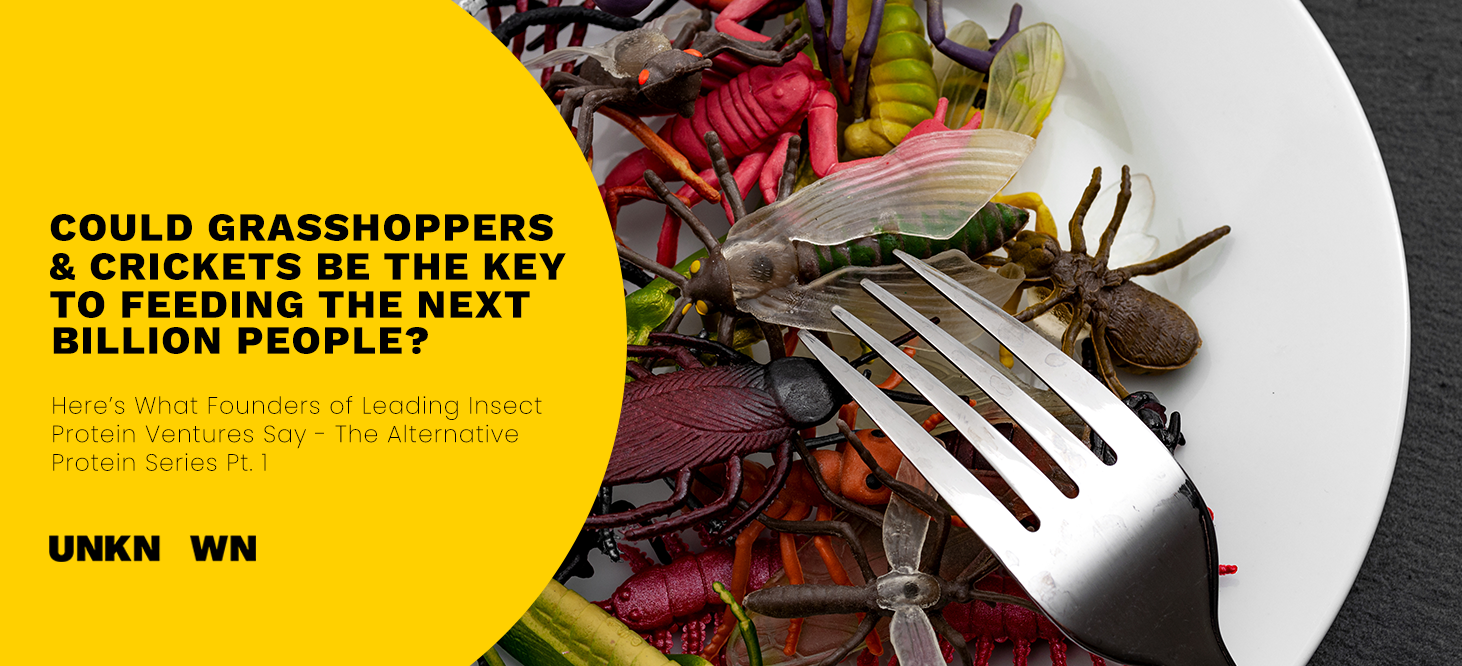August 11, 2021
Could Grasshoppers & Crickets Be The Key To Feeding The Next Billion People?

To help us dive deeper into the niche of insect proteins, we spoke with two founders in our portfolio about the current situation, prevailing challenges and the road ahead for their insect meat-producing ventures – Dror Tamir of Hargol FoodTech and Sander Peltenburg of Burgs Foods.
The global food system is not equipped to nourish today’s 815 million hungry and the additional 2 billion people expected by 2050.
The roadblocks to delivering tasty, healthy, accessible and sustainable food for all are formidable – modern industrial agriculture, mass factory farming, commercialized fast food, extractive capitalism and climate change, to name a few.
Fortunately, recent technology breakthroughs, coupled with changes in consumer and investor sentiment have led to the emergence of alternative proteins. Made from plants, insects or via tissue culture, alternative proteins provide a viable contrast to the unsustainable livestock proteins. This is due to the drastically lesser amount of water, feed and land required in their production.
According to Dror Tamir, Co-Founder and CEO of Hargol FoodTech, “… the future of food lies in alternative proteins. Better products that are healthier, with a smaller ecological footprint that taste at least as good as existing products”.
Hargol FoodTech operates the largest grasshopper farm in the world – a state-of-the-art 13,000 sq ft. facility, from which they cultivate and process over 40 million grasshoppers annually. “Now that we have developed our facility and are constantly optimizing our cultivation techniques, we can farm grasshoppers with minimal water, feed and land utilization”.
When asked about what gives insect-made proteins an edge over plant-based and lab-grown alternatives, Tamir points to its versatility – “While algae have to be processed into powder and cultured meat will stay in its meaty form, insects like grasshoppers can fit the entire protein market – to be powdered into protein or be cooked like meat”.
Nowadays, Hargol focuses on the fitness industry with their primary product offering – PRO72, their grasshopper-made protein powder. Packed with essential nutrients, it contains 72% proteins – significantly more than the prevalent whey and soy protein powder varieties. By all accounts, a superior product compared to what the market has to offer. Moreover, these powders can easily be used in producing meat products and beverages, both of which are on Hargol’s roadmap.
Hargol currently operates in a B2B model, selling a variety of products across the value chain – from raw to processed to powdered grasshoppers to food and beverage producers worldwide. “We have recently signed commercial distribution agreements in Asia, Europe and South America. In Q3 of 2021, we have commercial pilots kicking off in China, the USA and the Gulf region. The global interest confirms what we have known for a while – grasshoppers are one of the most efficient and viable sources of alternative proteins”, adds Tamir.
Another venture in our portfolio that is making magic with insects – while in a different stage of the supply chain – is Burgs Foods. Under the established brand, De Krekerij, Burgs Foods have rapidly grown to the role of pioneer of the Dutch market in the domain of cricket and grasshopper-made alternative meat products. Their Co-Founder, Sander Peltenburg believes that “crickets and grasshoppers will eventually become a staple in the European diet. We want to accelerate this adoption and achieve this by 2030”.
Growing awareness around climate change and unsustainable livestock farming practices, as well as increased demand for healthier nutrition, have led to a never-before-seen demand for alternative protein products from increasingly conscious consumers. Yet, owing to their creepy-crawly primary ingredient, insect-sourced meat products are not considered the ‘sexiest’ meat alternatives, as compared to the fast-maturing field of plant-based meats or the VC darlings, lab-grown meat. “For a lot of people, insects are still quite a strange thing. They are not happy to eat whole insects or put them in their salad”, remarks Peltenburg.
He continues “To combat this hesitance, we process insects into meat products – making them totally unrecognizable from insects and more like products we can find in plates of homes and restaurants – burgers, bitterballen, sausage rolls, pulled meat. Customers buying our products never need to worry about them looking or tasting like crickets or grasshoppers”, he concludes.
The last few decades have shown us that nothing about our diets is fixed. From the fast-food phenomenon in the 90’s to factory-farmed chicken in the 2000s to the recent successes of the plant-based Impossible Burger – the way we eat has been disrupted time and again.
Who is to say that cricket flour and grasshopper protein aren’t the next frontiers in how we consume our proteins? The founders have spoken – as alternative insect-made proteins are everything that the status quo is not – ethical, ecologically sound and more efficient. Solutions in this field are nearing maturation and are equipped to do their part in providing healthy and sustainable nutrition to the next two billion inhabitants of our planet.
With Tomorrow’s Taste, Unknown Group’s initiative in the food domain, we are putting our weight behind innovative FoodTech solutions that are turning the world’s problems into opportunities. With our Venture Engine we create a portfolio of companies committed to creating Tomorrow’s Taste. Together with industry leaders we select the best ventures worldwide and bring them forward. We invest and actively support the ventures to bring their solutions into the market with a vast network of leading corporates.
Seeing the future from the founders’ perspectives and identifying the most innovative startups worldwide is where we excel. Keep an eye out for our next article in this series, where we examine the latest developments in plant-based alternative proteins!
